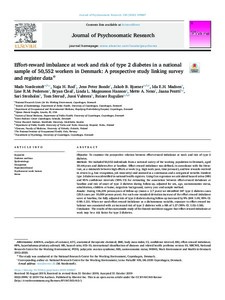Effort-reward imbalance at work and risk of type 2 diabetes in a national sample of 50,552 workers in Denmark: A prospective study linking survey and register data
; Bryan Cleal; Jakob B. Bjorner; Ida E.H. Madsen; Tom Sterud; Reiner Rugulies; Jussi Vahtera; Jens Peter Bonde; Naja H. Rod; Jaana Pentti; Mette A. Nexo; Mads Nordentoft; Linda L. Magnusson Hanson; Sari Stenholm; Line R.M. Pedersen
Effort-reward imbalance at work and risk of type 2 diabetes in a national sample of 50,552 workers in Denmark: A prospective study linking survey and register data
Bryan Cleal
Jakob B. Bjorner
Ida E.H. Madsen
Tom Sterud
Reiner Rugulies
Jussi Vahtera
Jens Peter Bonde
Naja H. Rod
Jaana Pentti
Mette A. Nexo
Mads Nordentoft
Linda L. Magnusson Hanson
Sari Stenholm
Line R.M. Pedersen
PERGAMON-ELSEVIER SCIENCE LTD
Julkaisun pysyvä osoite on:
https://urn.fi/URN:NBN:fi-fe2021042823929
https://urn.fi/URN:NBN:fi-fe2021042823929
Tiivistelmä
Objective: To examine the prospective relation between effort-reward imbalance at work and risk of type 2 diabetes.Methods: We included 50,552 individuals from a national survey of the working population in Denmark, aged 30-64 years and diabetes-free at baseline. Effort-reward imbalance was defined, in accordance with the literature, as a mismatch between high efforts at work (e.g. high work pace, time pressure), and low rewards received in return (e.g. low recognition, job insecurity) and assessed as a continuous and a categorical variable. Incident type 2 diabetes was identified in national health registers. Using Cox regression we calculated hazard ratios (HR) and 95% confidence intervals (95% CI) for estimating the association between effort-reward imbalance at baseline and risk of onset of type 2 diabetes during follow-up, adjusted for sex, age, socioeconomic status, cohabitation, children at home, migration background, survey year and sample method.Results: During 136,239 person-years of follow-up (mean = 2.7 years) we identified 347 type 2 diabetes cases (25.5 cases per 10,000 person-years). For each one standard deviation increase of the effort-reward imbalance score at baseline, the fully adjusted risk of type 2 diabetes during follow-up increased by 9% (HR: 1.09, 95% CI: 0.98-1.21). When we used effort-reward imbalance as a dichotomous variable, exposure to effort-reward imbalance was associated with an increased risk of type 2 diabetes with a HR of 1.27 (95% CI: 1.02-1.58).Conclusion The results of this nationwide study of the Danish workforce suggest that effort-reward imbalance at work may be a risk factor for type 2 diabetes.
Kokoelmat
- Rinnakkaistallenteet [19218]
